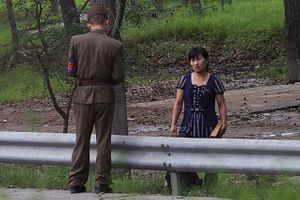A majority of North Koreans who escape and defect are women, who are often at an extremely high risk of being sold as brides or being subjected to sexual violence. In 2010, one aid worker estimated that around 90 percent of North Korean women escapees ended up becoming victims of human trafficking. This includes exploitive labor and prostitution, but bride trafficking has been a large market in the rural areas of China, close to the North Korean border.
Demand for brides in the more rural regions of China has surged with the male-female gap, a legacy of the “one-child policy.” Because of the country’s historic preference for male children, selective abortions of female fetuses have resulted in 122 boys being born for every 100 girls. In the three provinces closest to North Korea, the ratio of young men to women is 14:1.
According to statements from victims, the women are sold to older Chinese men for 2,000 yuan ($260) to 20,000 yuan ($2,600); the price varies depending on the woman’s age or appearance. Scouts seek “marketable” women, then lure them into China, usually with promises of more food and money. Many women who escape into China are from areas close to the Chinese border, usually living in poverty. “Distributors” match the women to the buyer’s preferences, and the brokers complete the sale. Some women are able to escape from their forced marriages with the help of underground human rights organizations, while others decide to adapt to their new life rather than face the risk of deportation.
If the escapees are caught by police, they will be deported back to North Korea. That is unless the police happen to be corrupt, in which case the women may be sold to another broker. China has been criticized for violating the United Nations Convention Relating to the Status of Refugees, and the United Nations Convention Against Torture, which prohibits the deportation of refugees when they are at the risk of being tortured upon returning. For its part, China sees the North Korean refugees as an “economic threat,” and classifies them as “economic migrants.”
Refugees from North Korea are terrified of what awaits them if they are arrested and deported back to their homeland; a fear that is exploited by the traffickers. Some women may agree to be sold as a bride rather than be deported, while others are coerced into trading sex for their presence to be kept silent. North Korea has strict laws designed to maintain its racial purity; it denounces marriages to foreign nationals and does not allow the entry of Chinese-Koreans or other mixed race children. Mothers are separated from their children, and women who return pregnant are subjected to forced abortions. Witnesses have reported that a woman was forced to drown her half-Chinese newborn. Many other Chinese-Korean children are denied legal recognition, with an estimated 10,000-20,000 such “stateless” orphans in China.
Harsh punishments await those caught trying to escape North Korea, including the “three generation of punishment” rule, in which three generations of the defector’s family are sent to the notorious prison camps. Meanwhile, China’s bride trafficking industry continues to grow, with estimates suggesting that by 2020 there will be 30 million Chinese men unable to marry. With a large number of women continuing to flee North Korea, the risk that they will be exploited to meet this demand will only rise.

































